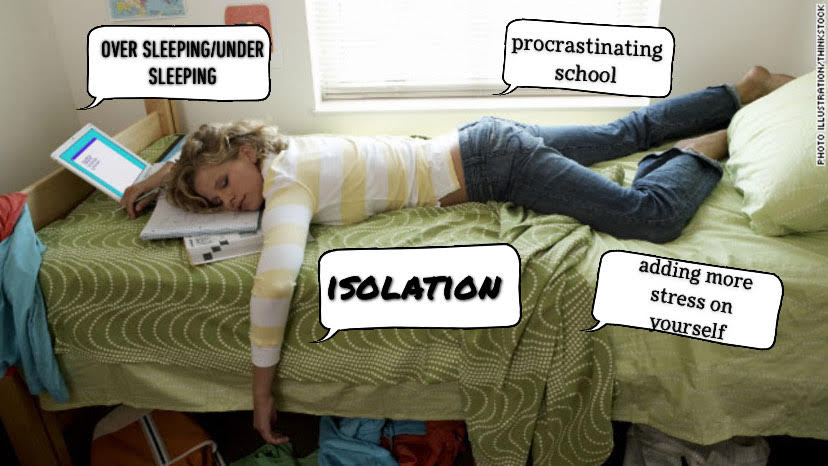How Mental Health Affects Students
January 19, 2022

A person’s mental health is based around their emotional, psychological, and social well being. It can affect how we think, feel, and act. It also can help determine how we handle stress, relate to others, and make choices. Mental health difficulties can have a huge impact on a student’s ability to engage in school and social interactions. According to the Center for Disease Control and Prevention, 9.4% of children aged 2-17 have been diagnosed with ADHD, 7.1% of children aged 3-17 have been diagnosed with anxiety, and 3.2% of children aged 3-17 have been diagnosed with depression.
These statistics are also reflected in SPASH students. Results from a SPASH mirror poll on how mental health affects students, shows evidence of this. 21 students selected that their mental health causes them to procrastinate school. Another 18 students selected that they aren’t able to shut off their minds. While another 4 students stated that their mental health causes them to stay home from school. 16 other students selected that they want to sleep all the time. While an additional 12 students revealed that they either under or over eat. And lastly, 6 students stated that their mental health causes them to isolate themselves from others. All of these things affect a student’s success in school and their overall experiences at school.
Anxiety
According to the Mayo Clinic, anxiety is when there is a large amount of continuous feelings of worry, tension and panic. This can interfere with daily life such as job performance, school work, and relationships. Anxiety can cause panic attacks, stress, trouble concentrating, dizziness, and frequent upset stomachs.
If left untreated, anxiety can make it hard for students to get work done and be able to have good study habits. A SPASH junior expressed how their anxiety makes them panic when walking in class or when they have tests or big assignments. They instantly feel as if they can’t do it because they will fail. This shows how students with anxiety often struggle with participation in class, like in group work or oral projects. Another downside is it can cause students to miss a lot of school or avoid school altogether.
The Anxiety Treatment Center of Austin, states that anxiety is linked to a decline in relationship satisfaction. Fear can make it difficult to spend time in social relationships and form deeper connections with others. When a SPASH sophomore was asked how their anxiety affects family they stated, “Struggling with family issues also causes me anxiety because I’m constantly worrying about my future and if I’ll end up like my parents. It makes me scared to grow up and causes me to not see a happy life or successful life after high school.” This shows how anxiety can cause you to overthink and put inaccurate thoughts in your head.
Attention-Deficit Hyperactivity Disorder
The research Mayo clinic did on ADHD shows how the chronic condition affects millions of children and often continues into adulthood. This includes a combination of persistent problems, such as difficulty sustaining attention, hyperactivity and impulsive behavior. The Mayo Clinic also states that ADHD can lead to poor work or school performance, low self-esteem, and other problems. When a junior at SPASH was asked how ADHD affects them they revealed that it causes them to have a poor attention span. This affects their learning and ability to do their school work.
Students that struggle with ADHD may be fidgety, restless, won’t put a lot of effort into work, and may talk too much and disrupt class. Having ADHD can lead to more conflicts within relationships. It can create more demands for attention within relationships. They are more likely to get bored, distracted or checked out of conversations. Students with ADHD have a harder time managing emotions and interacting with peers.
Eating Disorders
Eating disorders are continuous eating behaviors that negatively impact your health, your emotions and your ability to function in important areas of life. The most common eating disorders are anorexia, bulimia and binge eating. Anorexia is caused by distorted ideas of body image and fear of gaining weight, so they starve themselves. Bulimia involves frequent periods of eating large amounts of food, followed by fasting, over exercising, or puking. Binge eating is caused by constant cravings that occur anytime of day that results in eating a lot of food.
Eating disorders can produce periods of inactivity in school, and setbacks that force you to fall further and further behind. This can cause you to be withdrawn, emotionally numb, unexpressive, disinterested in activities, anti-social, and incapable of concentrating. A SPASH sophomore talks about how their eating disorder caused them to always feel tired and weak. And how lack of food would affect their ability to focus and do work. Another SPASH student explained how their eating disorder makes them feel like they can’t eat infront of anyone or eat at all. It also causes her to think everyone is judging her and looking at her body.
Depression
Depression is a serious mental health problem that causes continuous feelings of sadness and loss of interest in activities. It affects how a teenager thinks, feels, and behaves. Depression can cause emotional, functional, and physical problems. It can cause you to shut down and lose all motivation to do anything. This causes your work to pile up and your grades to drop. It can make you constantly feel exhausted and want to sleep all the time. This leads to procrastinating in and out of school.
During depressive episodes you can shut out the people that care about you and get distant with the world. People think this helps but it can cause the episode to last longer and be more intense. It can make you feel more alone and may increase the chances of your inner thoughts getting to you. “My mind makes it hard to do simple things like wake up, get out of bed, keep good hygiene, and be productive in school”, states a Junior at SPASH. Depression has a huge impact on a person’s motivation and success in school. Another SPASH student explained, “When I am going through a depressive episode I am not myself and I try to hide my feelings like they dont matter but they do! When it’s a long episode my mind can’t take it any longer and internal pain bleeds outwards into back pain, headaches, and other types of physical pain. It takes me a lot to get through the days and when I’m at school and home I don’t have the motivation to do anything.”
Depression affects all students differently but is mainly wrapped around not having motivation and isolation.
How Teachers Can Help
In conclusion, many health behaviors and habits are established in the teen years and will be carried over to adult years. This is why It’s very important to help youth develop good mental health. Building strong bonds and connecting to youth can protect their mental health. Every student with mental health is different. Some need help paying attention and managing distractions, some need help staying organized, and others need help getting started with their work or finishing work they start. Some students have trouble staying seated or working quietly. The more teachers get involved to help students when they notice change in behavior, the easier school is on students.




































































